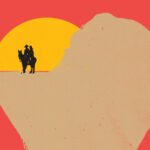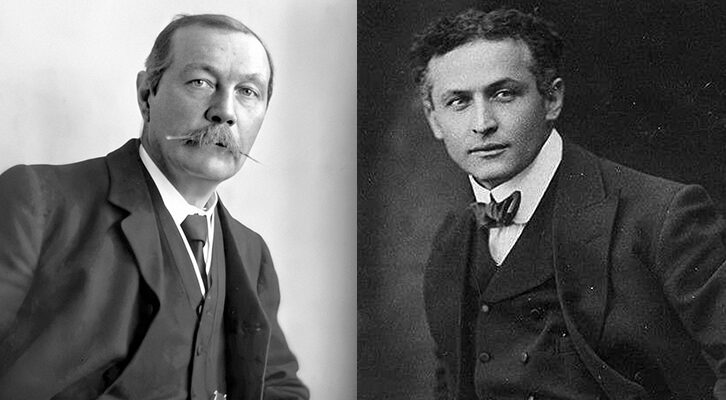A Love Letter to Lovers of Outlander
You Inhabit a Wild and Curious Planet
Outlander fans inhabit a wild, curious planet. They are almost entirely women, passionately worshipping across blogs, podcasts and message boards, in knitting circles and exercise groups, on organized trips to the Scottish countryside, where much of this time-travelling romance series takes place. They make T-shirts, tchotchkes, and scented candles; they start online debates so heated that people occasionally get forcibly ejected; they use the fire emoji a lot, probably too much; someone crocheted this creepy and amazing doll.
I’m a romance fan in general, and an Outlander fan in particular—I get it, the full-tilt, full-bodied involvement in this universe, the daydreaming in Highland greens. But because the first book was published in 1991, the year before I was born, the majority of these fans are not my peers: they are largely middle-aged, married, or mothers, women who discovered the series nearly thirty years ago. They have aged alongside the characters, and lived with an immovable Outlander shelf for a pop culture eternity. This isn’t boy band infatuation, the kind of female desirous energy that gets dismissed as fleeting and juvenile. This is grown-up fidelity sustained over decades—unreserved, lusty, forcefully serious devotion.
Diana Gabaldon’s books—and now the cable drama adapted from them, whose season finale aired on Jan. 27—follow Claire, a World War II English combat nurse, as she accidentally travels back to the eighteenth century and falls for heartthrob Scottish Highlander Jamie Fraser. Superfans cite lots of things they’re drawn to: character depth, engrossing storytelling, emotional focus, sumptuous atmosphere, Jamie himself, a whole lot of je ne sais quoi. For a show with a radically female gaze and books that tip occasionally into emotionally-imbued, female-pleasure-centric erotica, women’s sexuality is an undeniable facet: “One of the things that drew me in was how sensual a woman can be,” said Mary Larsen, co-founder (with her husband) of Outlander Cast, a podcast on the series. “I love that Claire is brilliant and strong and in control of herself—but also, girlfriend likes to have sex.”
Thousands of pages center on every crag of Claire’s internal landscape in a way very few series attempt, especially as the books progress and she grows from a hungry twenty-something into a commanding, middle-aged matriarch. “She is my age in the last books,” said Tiina Kerkola, the Finnish 51-year-old behind @outlanderscotland, “and the books cover everything, menopause, things that women go through.” Larsen similarly spoke of Claire as a proxy, accessible in all her bodily reality—“I like that Diana weaves in these things, these extra real human bits, that are taboo to talk about at dinner,” she said.
Middle-aged women are largely ignored in popular fiction, and romance gets dismissed as often: as ridiculous, by those who don’t have time for feminine dreamscapes, and as regressive, by those who rightly want to tell stories about women beyond their relationships to men. There are, of course, limits to what the genre can do. But taking this type of female-centric storytelling seriously, on its own terms, reveals its refreshing aspects. It allows women readers to identify with a fictional world and express themselves within its borders; to explore a particular set of desires, forbidden or forgotten elsewhere; to self-prioritize, feel vicariously fulfilled, and take a deliriously fun break.
“I’ve worked my whole life and raised three kids, and for me, reading was always like, ok, now I’m going up to my room—it’s my time,” said Janet Reynolds, associate editor for Outlander Cast. “Outlander absolutely is escape, it absolutely is self-care, and it’s fun.” I couldn’t agree more; in a stupid, patriarchal world that de-centers women, reading romance feels a lot like setting aside time for a bubble bath. Only Jamie Fraser is there, which makes it a way better bubble bath.
Fan outpouring is verbose, creative, and giddy because Outlander provides a safe, sanctioned place to expand.Fan outpouring is verbose, creative, and giddy because Outlander provides a safe, sanctioned place to expand. Tracy Sterling said her Instagram account, @outlanderobsessed, was born of excess enthusiasm; she was watching alone and brimming with feeling. “There’s not a day that goes by that I don’t think about Outlander,” she said, the force of this clear to me even over the phone.
She isn’t alone; the sheer volume of fan content out there, the creativity and care with which it’s painted, written, sewn, collaged, captioned, and shared, hint at fans’ capacity for consistent, imaginative engagement. “It’s a creative outlet for me,” said Tracy Alexander of her blog, Outcandour. “I’m a veterinarian in my real life, and I don’t get much chance to flex that side of my brain.” Perhaps most importantly, though, fans need to talk about it, to find each other. With friends or coworkers, Tracy Sterling sometimes feels embarrassed—anxiety that it’s “kind of silly” to be a 53-year-old mom obsessed with a series. But among an online community of women, there is no judgment, and she doesn’t hold back.
If it’s hard for fans to articulate the series’ hold on their heartspaces, it’s because Outlander speaks to deep, subterranean hopes, and because it’s about filling a lack. Desire is its lifeblood—its storytelling crests with want and reconciles upon satisfaction. Fans constantly call Jamie and Claire the “ideal couple,” because of their open communication, emotional intimacy, and equal partnership. But the best romance stories speak to the non-romantic needs of their characters, too, and Claire wants everything. She wants to vocalize and express herself, to be serious and taken seriously, to construct her own narrative and center herself within it—which she does, running around the Highlands becoming a surgeon, a leader, a straight-up orchestrator of futures (and, don’t mistake, having tons of orgasms).
That makes the Outlander fantasy really about getting yours, in every way: experiencing hunger and sating it, yearning for fulfillment and attaining it, writing yourself actively and unflinchingly into your own fantasy. In a barren, dude-ly media landscape, women are congregating where female bodies and hearts have gravitational pull; here, all your limitless yearning, the stuff even you dismissed as unrealistic or ridiculous, is treated with seriousness. As possibility.
In many ways, loving Outlander is less about minutiae than about big feeling, broad implications. So many of the specifics don’t work—the flat treatment of enslaved and Native characters, the pervasiveness of sexual violence, how often the storytelling veers into the absurd, contrived, and over-written—and yet I return, again and again. Kerkola and I are separated by more than twenty years, four thousand miles, and the languages we use to read Outlander, but I sparked with recognition when she talked about seeing herself in Claire’s arc. The series is speaking to both our innermost wishful selves.
Which is not to say that Outlander women are necessarily unsatisfied—just that they want to keep dreaming, chasing the things that will nourish them, even well into settled life. Multiple married women divulged to me that Outlander made their sex lives better by reminding them that they deserve to ask for what they want in bed. Janet Reynolds wrote on the blog about deepening meaningful connections continually over a lifetime. And Tracy Sterling credited the series with emboldening her to re-up a modeling career, something she had abandoned when she was much younger. With renewed resolve and “the courage to ask,” she re-signed with an agency about two months ago.
That’s what fans are so drawn to, what they’re crocheting dolls about: their deep yearnings, affirmed at last. The real-world possibilities of chasing real, vital desire. Here, you can be silly and sweeping and hopeful, and no one will judge. You can flee to the fantasy place for a while, those verdant Highlands where your body is respected and your heart is free, and bring a little fantasy back with you. Go after it, write yourself in. Covet away.




















